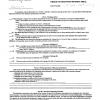Dear Mr President,
I wish to bring to your attention a troubling development in Rwanda's business and investment climate. This is, of course, an area in which your organization regularly showcases Rwanda as a star performer. Your 2017 Doing Business Report ranks Rwanda 2nd in Africa after Mauritius, and 56th globally out of 190 countries.
These rankings notwithstanding, there are signs that Rwanda's broader business and investment climate is not what it often appears to be. Allow me to illustrate this with a recent example.
On January 5, 2017, businesses and nonprofit organizations operating in residential premises or homes converted into offices were given three months to relocate to commercial facilities. By the end of March 2017, all businesses and nonprofit organizations in Kigali must have complied with this order. Two factors appear to have led to this draconian directive: a) modernization/beautification of the city of Kigali in accordance with its master plan; b) the recent construction boom of large and expensive commercial real properties whose occupation rates are as low as 50 percent, thereby raising the spectre of loan-defaults and bankruptcies.
That is the context in which the government of Rwanda ordered businesses and nonprofit organizations to move to commercial buildings in the following terms:
"We have written to...[businesses and nonprofit organizations] and given them three months to relocate from residential houses and we requested commercial building owners to reduce the rental fees to make it affordable for the tenants."
Mr President, you would agree that the Rwanda government directive sharply contradicts the spirit and practice of private enterprise in a double sense. First, it is the state dictating where owners of businesses and nonprofit organizations should operate. Second, it is the state determining what commercial buildings ought to charge tenants. What emerges here is a strange form of capitalism controlled by the state as opposed to business owners transacting in the market place. The state is no longer regulating but commanding commerce and industry.
But there is an even bigger problem here. Businesses and nonprofit organizations in Rwanda remain overwhelmingly informal, micro, and small employing between one and five people. This reality is recognized by the World Bank, whose overview of Rwanda's development challenges reads as follows:
"Going forward, the private sector, which is still largely informal, will have to play a bigger role in ensuring economic growth. Poor infrastructure and lack of access to electricity are some of the major constraints to private investment. As Rwanda’s investment relies a lot on foreign aid, stable inflows of this foreign aid are critical to keep the current high investment rate at around 25% of GDP."
Mr President, it is these largely informal and small businesses together with nonprofit organizations that are under official attack. They face harassment and possibly closure as most of them cannot afford rents in commercial buildings. The Rwandan authorities seem determined to make a bad situation worse. In their ill-conceived "solution" to the ruinous high vacancy rates in commercial buildings, the government wants to throw small businesses and nonprofit organizations under the bus, too.
In conclusion, Mr President, evidently, the World Bank has something of reputational risk here. The excellent Doing Business rankings you continuously grant Rwanda will be questioned if businesses are under state command and not their owners. We hope that as a partner to Rwanda, you can use your good offices to persuade the Rwandan authorities to change course before further damage is done to the country's nascent private sector.
Most Sincerely,
David Himbara,
January 9, 2017
















